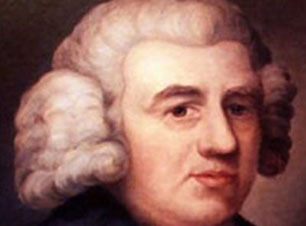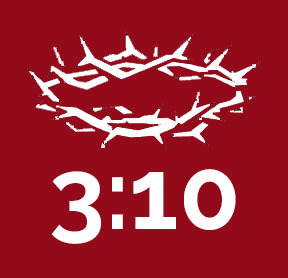
Portrait of The Reverend John Newton
[Image may be subject to copyright]
Amazing Grace
One of the best known and best loved Christian hymns is Amazing Grace, which was written by John Newton (July 24 1725 – December 21 1807)
Early Life At Sea
When he was 11 years old, John went to sea with his father and continued sailing with him until his father retired in 1742. The following year at the age of 17 young John found himself forcibly press-ganged into serving as a mid-shipman on HMS Harwich, an English warship.
Slave & Slave Trader
At his own request, Newton was transferred to serve on a slave ship bound for Sierra Leone in West Africa. There he became a slave himself of a slave trader, and suffered physical abuse, starvation, illness and exposure. After being freed, he became the captain of a slave ship, carrying slaves across the Atlantic from West Africa to The Caribbean.
John Newton's Encounter With God In A Storm May 10, 1748
While serving on board ship during a tremendous storm on May 10, 1748 John Newton had what he referred to later as his “great deliverance." Newton recorded in his journal that when all seemed lost and he was sure the ship would sink, he cried out, “Lord, have mercy upon us." Later in his cabin he reflected on what he had said. As a result of his preservation from death, he began to believe that God had spoken to him through the storm and that God’s grace had begun to work for him.
Marriage & Ministry
In 1750 John married his childhood sweetheart Mary Catlett and in 1755 was employed as a pilot on the River Mersey at the port of Liverpool, where he began studying Greek, Hebrew and Latin in his spare time, feeling God calling him into ministry as a preacher. He was eventually ordained by the Bishop of Lincoln as Curate of the Parish of Olney in Buckinghamshire.
"Amazing Grace"- John Newton's Testimony Of Conversion
He wrote many hymns, the most famous being Amazing Grace, which Newton wrote for a service on New Year’s Day, 1773. It is the testimony of his conversion. The first verse reads:
Amazing grace (how sweet the sound)
That saved a wretch like me!
I once was lost, but now am found,
Was blind, but now I see.
John Newton's Part In The Abolition Of The Slave-Trade In Britain
In 1780 Newton left Olney to become Rector of St. Mary Woolnoth, London where he became a well known preacher and influenced many, including the young William Wilberforce, who later became a leader in the campaign to abolish slavery. He died in London on the 21st December, 1807. He lived to see William Wilberforce’s bill abolishing the slave trade passed in Parliament earlier that year.
Video of "Amazing Grace"
For more about John Newton and the story of Amazing Grace, click AMAZING GRACE
Paul on The Wonders of God's Grace
To read Paul's description of the wonders of God's grace, click PAUL ON GRACE



